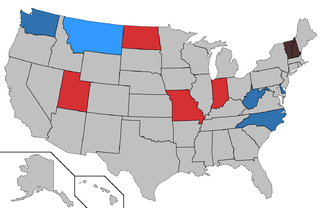United States gubernatorial elections, 2020
United States gubernatorial elections will be held on November 3, 2020 in 11 states and two territories. In addition, special elections may take place (depending on state law) if other gubernatorial seats are vacated. The last regular gubernatorial elections for nine of the eleven states took place in 2016. The last gubernatorial elections for New Hampshire and Vermont will have taken place in 2018, as the governors of both states serve two-year terms. The 2020 gubernatorial elections will take place concurrently with several other federal, state, and local elections, including the presidential election.
Race summary
States
| State | Incumbent | Party | First elected | Incumbent status | Candidates |
|---|---|---|---|---|---|
| Delaware | John Carney | Democratic | 2016 | Eligible | |
| Indiana | Eric Holcomb | Republican | 2016 | Eligible | |
| Missouri | Eric Greitens | Republican | 2016 | Eligible | |
| Montana | Steve Bullock | Democratic | 2012 | Term-limited | |
| New Hampshire | TBD | TBD | TBD | TBD | |
| North Carolina | TBD | TBD | TBD | TBD | |
| North Dakota | Doug Burgum | Republican | 2016 | Eligible | |
| Utah | Gary Herbert | Republican | 2010 | Eligible | |
| Vermont | TBD | TBD | TBD | TBD | |
| Washington | Jay Inslee | Democratic | 2012 | Eligible | |
| West Virginia | Jim Justice | Democratic | 2016 | Eligible |
Territories
| State | Incumbent | Party | First elected | Incumbent Status | Candidates |
|---|---|---|---|---|---|
| American Samoa | Lolo Letalu Matalasi Moliga | Independent | 2012 | Term-limited | |
| Puerto Rico | Ricky Rosselló | PNP | 2016 | Eligible |
Retiring and term-limited Democratic incumbents
Steve Bullock (Montana)
Two-term incumbent Governor Steve Bullock is term-limited in 2020.
Retiring Republican incumbents
Gary Herbert (Utah)
Two-term incumbent Governor Gary Herbert is eligible for re-election in 2020, as Utah does not have gubernatorial term limits. However, he announced shortly after being re-elected in 2016 that he will not run for a third full term.[1]
Democratic incumbents eligible for re-election
John Carney (Delaware)
One-term incumbent Governor John Carney is eligible for re-election in 2020.
Jim Justice (West Virginia)
One-term incumbent Governor Jim Justice is eligible for re-election 2020.
Jay Inslee (Washington)
Two-term incumbent Governor Jay Inslee is eligible to run for re-election in 2020, as Washington does not have gubernatorial term limits.
Republican incumbent eligible for reelection
Eric Holcomb (Indiana)
One-term incumbent Governor Eric Holcomb is eligible for re-election in 2020.
Eric Greitens (Missouri)
One-term incumbent Governor Eric Greitens is eligible for re-election in 2020.
Doug Burgum (North Dakota)
One-term incumbent Governor Doug Burgum is eligible for re-election in 2020.
Undetermined incumbent
North Carolina
Either two-term incumbent Governor Pat McCrory will win re-election in 2016 and be term-limited, or Attorney General Roy Cooper will win the 2016 election and be eligible for re-election in 2020. Neither side has conceded the race.[2]
New Hampshire
The incumbent for this election will be determined in the 2018 election.
Vermont
The incumbent for this election will be determined in the 2018 election.
Territorial races
Lolo Letalu Matalasi Moliga (American Samoa)
Two-term incumbent Governor Lolo Letalu Matalasi Moliga, an independent, is term-limited in 2020.
Alejandro García Padilla (Puerto Rico)
One-term incumbent Governor Ricky Rosselló of the New Progressive Party is eligible to run for re-election in 2020.
References
- ↑ Gehrke, Robert (8 November 2016). "Herbert wins his 3rd election as Utah governor". The Salt Lake Tribune. Retrieved 21 November 2016.
- ↑ Fausset, Richard (10 November 2016). "Roy Cooper Holds Thin Lead Over Gov. Pat McCrory in North Carolina". New York Times. Retrieved 11 November 2016.
